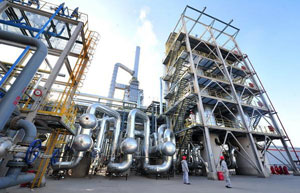China and Kuwait inked energy deals on Tuesday ahead of an annual forum of China and Arabian countries in Beijing this week.
Premier Li Keqiang and visiting Kuwaiti Prime Minister Sheikh Jaber al-Mubarak al-Hamad al-Sabah officiated at the signing ceremony after an hourlong meeting.
Under the agreements, the National Energy Administration and Petro China Co Limited, China's largest oil and gas producer and supplier, will deepen cooperation with the Gulf country.
China also won support from Kuwait, which is chairing the Gulf Cooperation Council and the League of Arab States this year, in the promotion of the establishment of an Asian investment bank — a multilateral bank to develop infrastructure projects — a proposal that China has long advocated.
During the meeting, Li urged Kuwait to open up its upstream market in oil and gas development to Chinese companies. He recalled his visit in 2008 to Kuwait, during which al-Sabah, then the deputy prime minister, accompanied Li throughout the trip, an event that the premier said is still "vivid" in his mind.
China hopes Kuwait will continue to make efforts to restart talk of a free trade area between China and Gulf countries, he said.
Al-Sabah said Kuwait is proud to be one of the first Gulf countries to establish diplomatic relations with China, and the country believes that the exchanges of high-level leaders of the two countries and exchanges on major issues of common concerns are important to both.
Bilateral trade between China and Kuwait topped $12.5 billion in 2013, the Ministry of Commerce said.
Al-Sabah will attend the opening ceremony of the sixth ministerial meeting of the China-Arab States Cooperation Forum on Thursday.
Foreign ministers, representatives of China and Arab countries, as well as Secretary-general of the League of Arab States Nabil Elaraby will attend the meeting. This year marks the 10th anniversary of the CASCF.
China is the second-largest trading partner of the Arab world and the top trading partner of nine Arab nations. The trade between China and the Arab states has risen from $25.5 billion to $239 billion in the past decade, while China's imports of crude oil from Arab countries rose from 40.6 million metric tons to 133 million tons. The amount of oil imported from the Middle East and Africa takes up 80 percent of China's total imported oil.
Chinese Foreign Minister Wang Yi said Kuwait and other Arab states, located at the western end of the economic belt along the Silk Road and the 21st Century Maritime Silk Road, are "natural and important cooperation partners for China".
|
 |
 |
